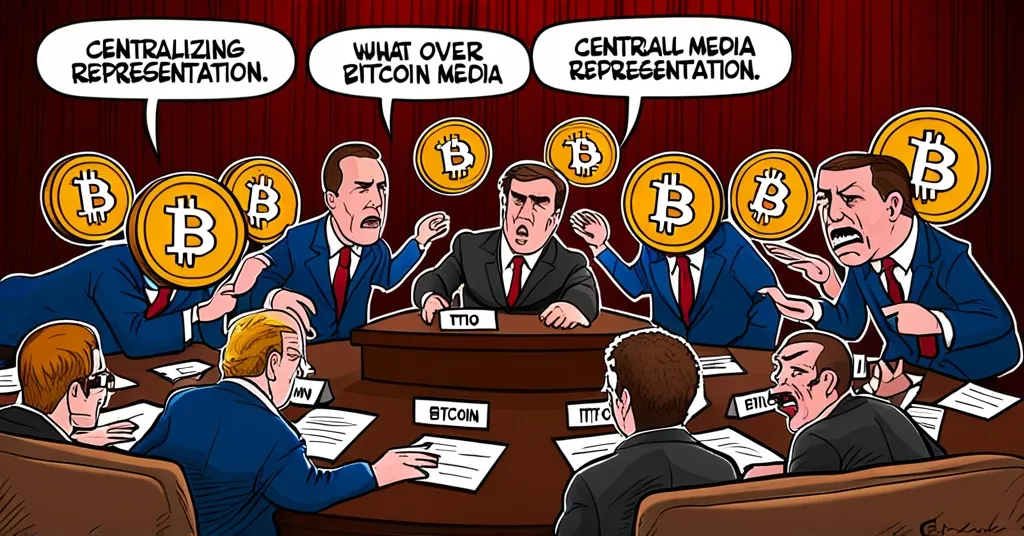Bitcoin Press Center: A Failed Attempt to Centralize Crypto Media Representation

Can a Decentralized Currency Like Bitcoin Ever Find Its Voice in the Mainstream Media?
- Bitcoin Press Center proposed in 2013 to enhance media coverage
- Controversy over inclusion of Roger Ver and Jon Matonis
- Attempt to centralize spokespeople fails, removed by January 2014
In April 2013, Bitcoin faced a pivotal moment in its quest for better media representation. Mike Hearn, a passionate Bitcoin developer, recognized the inconsistent quality of press coverage and proposed the Bitcoin Press Center on BitcoinTalk. His goal was to create a self-serve resource for journalists, connecting them with knowledgeable Bitcoin advocates. Hearn explained, “Over the last few years, many of us have been amazed by the variable quality of Bitcoin press coverage… Bitcoin does not have any dedicated PR people, nor should it. But we can do the next best thing by providing a really good self-serve press center on the website.”
However, the proposal quickly sparked controversy. The inclusion of Roger Ver, dubbed “Bitcoin Jesus,” and Jon Matonis, a former executive director of the Bitcoin Foundation, was hotly debated. Ver’s past conviction for selling explosives and Matonis’s political views on tax evasion raised concerns among some community members. Luke-Jr, a prominent Bitcoin developer, opposed Ver’s inclusion, stating,
Roger Ver, surely you can see how the media would be able to easily spin your past as ‘Roger Ver, spokesperson for Bitcoin, holds a conviction for selling explosives to terrorists’ or something along those lines?
The community’s reaction was nothing short of a digital uproar. Erik Voorhees, a vocal Bitcoin advocate, fiercely opposed the exclusion, arguing,
Bitcoin is not so weak and pathetic that it requires only tacit, cowed spokesmen who are more like politicians than real individuals with passion and ideology.
Andreas Antonopolous, another influential figure, attempted to expand the list and proposed a new website, bitcoinpresscenter.org, to promote a more inclusive representation. He emphasized,
We need more diversity of opinion, not a narrow set that fits someone’s idea of what is politically appropriate.
Despite these efforts, the Bitcoin Press Center was removed from Bitcoin.org by January 2014. The official site then directed journalists to the Bitcoin Foundation and Antonopolous’s new site as alternatives. This saga wasn’t just about choosing spokespeople; it was a battle for the soul of Bitcoin—whether it should remain a radical, decentralized currency or strive for mainstream acceptance. The ongoing debate around Bitcoin’s decentralization versus mainstream acceptance continues to shape its trajectory.
The Bitcoin Press Center episode serves as a stark reminder of the challenges in representing a decentralized movement. It underscores the ongoing debate about Bitcoin’s direction, balancing the ideals of decentralization with the necessity of effective communication with the mainstream world. As Bitcoin continues to evolve, these themes echo through the community’s discussions on governance, representation, and the future of money. The early community’s ideological divides are a testament to the passion and complexity of Bitcoin’s journey.
The Proposal
In 2013, Bitcoin was gaining traction but struggling with inconsistent media coverage. Mike Hearn’s Bitcoin Press Center aimed to provide a curated list of knowledgeable advocates for journalists, enhancing the quality and accuracy of Bitcoin press coverage.
The Controversy
The controversy centered on the inclusion of Roger Ver and Jon Matonis. Ver, known as “Bitcoin Jesus,” was excluded due to his criminal record for selling explosives, while Matonis faced criticism for his political views. This debate highlighted deep ideological divides within the community about representation and Bitcoin’s direction. The Bitcoin media representation controversy on platforms like Reddit further fueled the discussion.
The Aftermath
Despite attempts to diversify the list of spokespeople, the Bitcoin Press Center was removed from Bitcoin.org by January 2014. The site recommended journalists contact the Bitcoin Foundation and Andreas Antonopolous’s bitcoinpresscenter.org instead. This episode illustrated the community’s struggle to reconcile its decentralized ethos with the need for effective media representation.
Lessons Learned
The Bitcoin Press Center saga offers valuable lessons for today’s Bitcoin community. It highlights the difficulty of representing a decentralized movement and the ongoing tension between centralization and the need for effective communication with the mainstream world. These themes remain relevant as Bitcoin navigates its future path.
Key Figures Involved:
- Mike Hearn: Proposed the Bitcoin Press Center to improve media coverage.
- Roger Ver: Known as “Bitcoin Jesus,” was excluded due to his criminal record.
- Jon Matonis: Former executive director of the Bitcoin Foundation, excluded due to his political views.
- Luke-Jr: Opposed the inclusion of Ver and Matonis.
- Erik Voorhees: Argued against the exclusion of Ver and Matonis.
- Andreas Antonopolous: Proposed an alternative solution with bitcoinpresscenter.org.
Key Questions and Takeaways
What was the Bitcoin Press Center?
The Bitcoin Press Center was a proposed section on Bitcoin.org intended to provide journalists with a list of media contacts to improve the quality and accuracy of Bitcoin press coverage.
Why was the Bitcoin Press Center controversial?
The controversy arose over the inclusion of Roger Ver and Jon Matonis, who were excluded due to their criminal records and political views, leading to debates about representation and the direction of Bitcoin.
Who were the key figures involved in the Bitcoin Press Center debate?
Key figures included Mike Hearn, who proposed the Press Center, Roger Ver and Jon Matonis, who were excluded from the list, and developers like Luke-Jr, Jeff Garzik, and Greg Maxwell, who opposed their inclusion. Andreas Antonopolous was a vocal critic of the exclusion and proposed an alternative solution.
What was the outcome of the Bitcoin Press Center initiative?
The Bitcoin Press Center was ultimately removed from Bitcoin.org by January 2014, with the site directing journalists to the Bitcoin Foundation and Andreas Antonopolous’s bitcoinpresscenter.org instead.
What does the Bitcoin Press Center episode reveal about Bitcoin’s early community?
The episode highlights the ideological and cultural divides within Bitcoin’s early community, particularly around centralization, representation, and the balance between mainstream appeal and revolutionary ideals.
What lessons can be learned from the Bitcoin Press Center saga?
The saga underscores the ongoing tension between Bitcoin’s decentralized ethos and the need for effective communication with the mainstream world. It serves as a reminder of the challenges inherent in representing a decentralized movement and the importance of balancing centralization with the community’s values.



